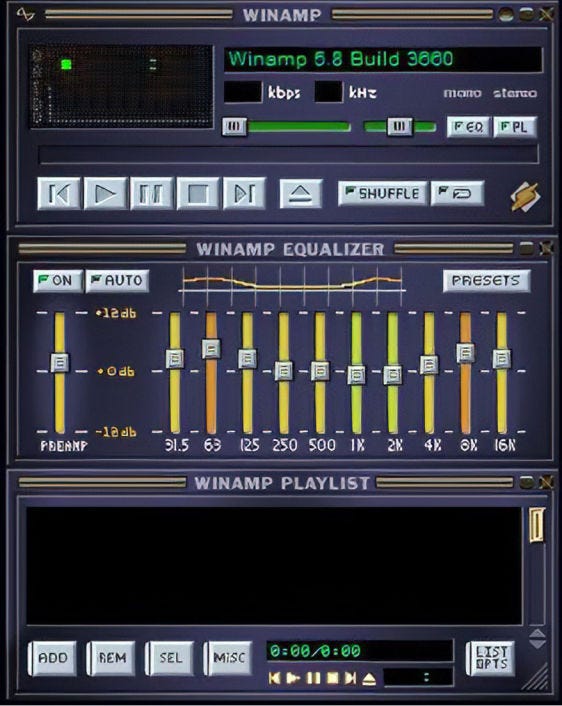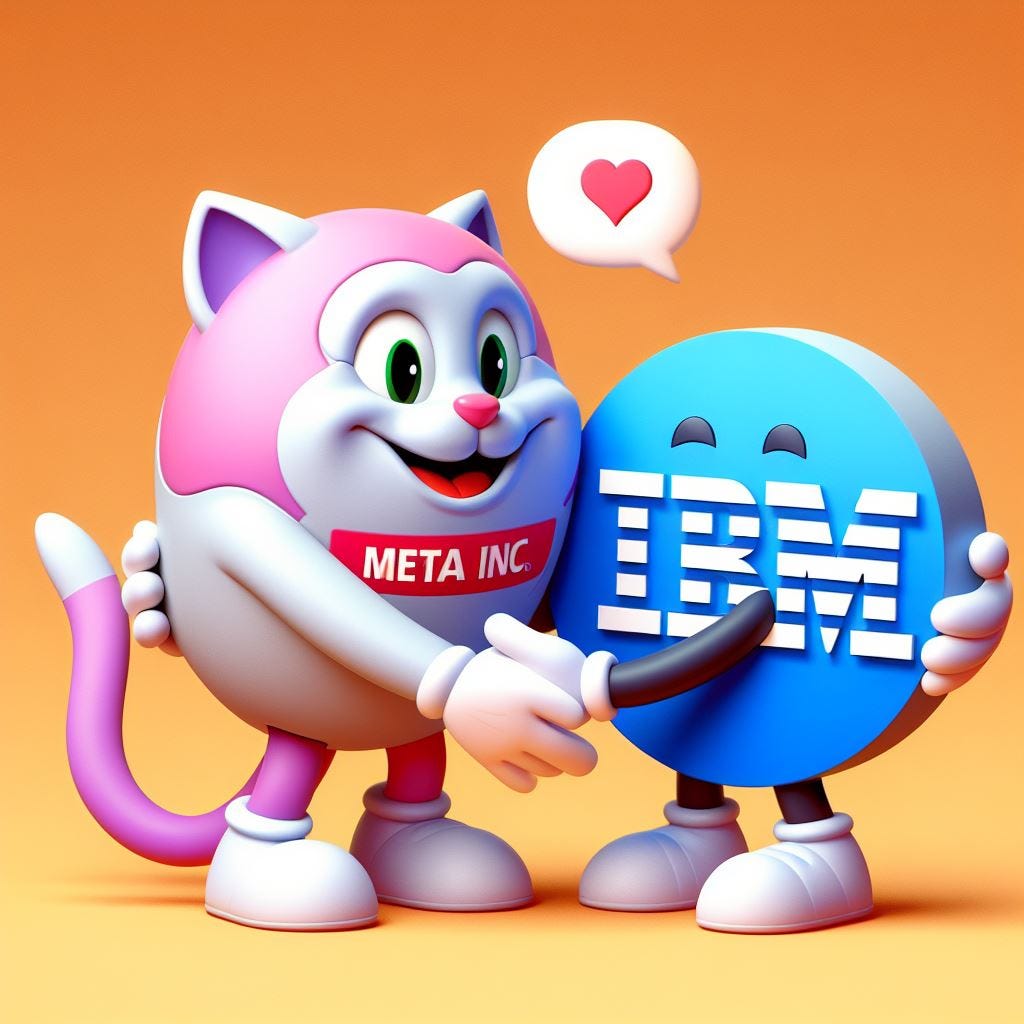Welcome to AI Collision 💥,
In today’s collision between AI and our world,
Napster, Gnutella and Winamp
AI going the way of the web?
Elon’s next billion dollars
If that’s enough to get the torrents downloading, read on…
AI Collision 💥 is AI going the way of the web?
I remember a time when the internet was just about “Top 10” lists, Napster and Gnutella downloads of MP3s to play on Winamp and asking “Jeeves” how to find cat videos.

It was a “simpler” time back then. But then again, when you start thinking about nostalgic things, everything always seems like a “simpler time”.
Truth be told, back in the early 2000s things were equally as challenging, but the internet wasn’t awash with it all then… that would come as the internet itself grew to become one almighty global social infrastructure.
The growth and advancement of the internet, how we use it and how all industry is connected to it, is one of the most outstanding technology phenomena of human history.
As a result of the growth and expansion and advancement of the “web”, wealth has been created at an unprecedented scale.
If the internet was not a “thing” then we would not have a company like Meta Inc. (NASDAQ:META) worth more than $800 billion. Alphabet Inc (NASDAQ:GOOG) would not be worth $1.6 trillion. Even a company like IBM (NYSE:IBM) wouldn’t have reached the heights of $150 billion plus in market cap.
This is just a sample of the companies now worth trillions of dollars in combined value. And before the turn of the century, a number of them didn’t even exist.
When you look at the rise of tech in our world, the connectivity to the web, the advances in speed, scale, you can see that with world-changing trends, comes immense wealth… for a few.
You see, as the web was in its nascent stages, there was an opportunity for it to head down a different path.
In 1989, Sir Tim Berners-Lee (the creator of the World Wide Web) published his seminal paper, “Information Management: A proposal”.
It was the foundation of the world wide web, using a “non-linear text system known as ‘hypertext’.”
As he noted in that paper:
“The aim would be to allow a place to be found for any information or reference which one felt was important, and a way of finding it afterwards. The result should be sufficiently attractive to use that it the information contained would grow past a critical threshold, so that the usefulness the scheme would in turn encourage its increased use.”
Several years later in 1997, as the internet was expanding, and commercial interests were digging deeper, a group of researchers from The Internet Society published, “A brief history of the internet”– Barry M. Leiner, Vinton G. Cerf, David D. Clark, Robert E. Kahn, Leonard Kleinrock, Daniel C. Lynch, Jon Postel, Larry G. Roberts and Stephen Wolff were the authors.
It’s well worth a read, as they cover the internet’s development to 1997 and a glimpse of what they saw coming (which all came true by the way).
But as they conclude the paper, they note,
“If the Internet stumbles, it will not be because we lack for technology, vision, or motivation. It will be because we cannot set a direction and march collectively into the future.”
It’s the age-old problem: at what point do we, or can we, march collectively into the future? Or is it the case that commercial interests will always take control?
The internet protocols are open and available for anyone to use. But the way in which we use the net, namely things like domain name space and cloud services, is highly centralised and concentrated.
Cloud alone is dominated by two players: Amazon Web Services (AWS) and Microsoft Azure. Together they control about 55% of all cloud services.
No wonder both Amazon and Microsoft are worth over $1 trillion each.
The reason I’m talking about the internet today is because the development of “in the wild” AI systems is also in its nascent stages.
In other words, we’re not in 1989, but we’re not completely in 1997 either… somewhere in between.
Which means there’s still a chance that AI doesn’t go the way of the web and a select few gigantic commercial interests take over control of the AI tools that we all can use.
At the same time, there’s still a window of opportunity for the AI-world versions of Meta and Google to come from seemingly nowhere to be the titans of AI in the future.
However, it certainly feels like AI is fast getting to that fork in the road.
Already the giants of tech are lining up to take control. Just yesterday, Meta and IBM launched what they’re calling the AI Alliance.
This “alliance” of 50 organisations (yes, just 50, at least to start with) is, “coming together to support open innovation and open science in AI.”
I dunno, but 50 organisations doesn’t seem very open to me.
You also have to remember that companies like IBM and Meta, and others included in the “alliance” including AMD, Sony, Dell, Intel and Oracle, don’t have a responsibility to “open” anything.
They have a responsibility to return value to shareholders. So you always need to remember that what they say and what they want are often competing views.
Which ultimately means there’s probably little you can do about whether the future of AI is truly “open” or whether these corporate interests find a way through “alliances” like this to commercialise and make profits from its development… just like they have with the web.
If the latter is the case, I guess there’s no point crying about it, but buying it instead.
If the future of AI is one led by Meta, IBM, Google, Microsoft, and anyone else, I guess the only thing to figure out (whether you like it or not) is how much you’re going to invest in each one.
AI Gone Wild 🤪
How long ago did Elon Musk launch X.ai, his AI company that he’s integrating into X.com? Three, four, eight weeks ago?
The platform’s AI, known as Grok, is supposed to be more advanced than anything else at delivering natural language responses to real-time, real-world events.
After all, it is trained on X.com data. And speaking of “trained” we also know that Elon had about 8,000 Nvidia A100 GPUs as the backend hardware that were used to train Grok. And that going forward, Elon said they’d be looking to double their compute with Grok every couple of months.
Well, we’re getting close to a couple of months from Grok’s release already. So it must be time for Elon to load up on more A100s or whatever other AI GPU hardware he’s going for (most likely Nvidia gear).
In fact, we know he must be loading up on hardware because he’s going back to the capital markets to fund it.
X.ai is looking to raise…
Wait for it…
It seems like the commercial interests are very strong with this one too.
Oh, and by the way, it’s not an initial public offering (IPO). You’re not getting anywhere near this capital raise. Most people never do get anywhere near these kinds of funding rounds.
At least most of the time.
There are a few ways to get exposure to these VC-level style plays. But maybe more on that in a couple of weeks’ time…
Nonetheless, a billion here, a billion there, it seems like the capital is well and truly flowing to AI still. It does suggest that if 2023 was the realisation that AI was going to reshape the very fabric of the world… then maybe 2024 is the year that will reshape the fabric of the markets and capital allocations.
I suspect that we’ve not yet truly seen the AI mania take hold in the market, and that 2024 will see a spate of AI companies hit the market, IPO and reverse takeover (via SPACs) into the market again.
As capital starts to loosen up a bit and flow again, just wait and see what that’s going to do with AI companies. Elon’s next AI billion is just the start.
Boomers & Busters 💰
AI and AI-related stocks moving and shaking up the markets this week. (All performance data below over the rolling week).
Boom 📈
UiPath(NYSE:PATH) up 29%
Predictive Oncology (NASDAQ:POAI) up 8%
iRobot (NASDAQ:IRBT) up 7%
Bust 📉
Brainchip Holding (ASX:BRN) down 21%
Gorilla Technology (NASDAQ:GRRR) down 14%
Appen Ltd (ASX:APN) down 11%
From the hive mind 🧠
For all the good AI will bring, you can rely on the central bank to only think about the downside, like financial instability.
Nvidia dominates the AI chip market. And probably will for another year or two. But is AMD hot on its heels? Can AMD challenge the might of Nvidia. This chip may give them a shot.
But if AMD is challenging over there, then over here Nvidia seems to have a bit more respect for what Huawei is doing.
Artificial Polltelligence 🗳️
Based on our issue from Tuesday, I wonder how much you’d care if short, sharp market updates came to you from a real person (like me) or from an AI avatar of me.
Weirdest AI image of the day
Harry Potter and the Suspicious Powder in a Burger King Bathroom – r/Weirddalle
ChatGPT quote of the day
"Imagination is the Discovering Faculty, pre-eminently. It is that which penetrates into the unseen worlds around us, the worlds of Science." – Ada Lovelace
Thanks for reading, see you on Tuesday (and don’t forget to leave your comments below)
















